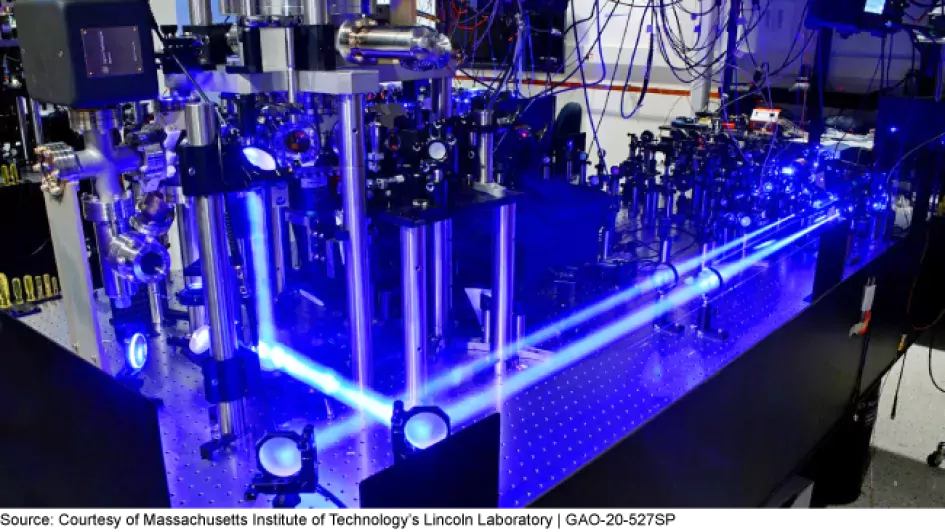Quantum Technology Leaping Toward Reality
Quantum physics is a tough subject to study. Even revered physicist Richard Feynman once wrote that even “physics has given up” trying to fully understand it. But that does not mean human ingenuity cannot harness the mysteries of quantum physics for practical advantage.
In today’s WatchBlog, we explore quantum technology, which would use quantum physics to revolutionize navigation, encryption, and other technologies. Such advances would come with major implications for the U.S. military and federal cybersecurity.
The image shows a trapped ion qubit (a quantum bit) test bed in the Quantum Information and Integrated Nanosystems Group at Lincoln Laboratory.
Baffling science, transformative technology
Quantum physics studies the behavior of the smallest particles of matter or energy, which sometimes behave in ways that seem impossible. For example, such particles can be in multiple states at once—a property known as “superposition.” They can also be “entangled”—linked in a way that lets you get information about one particle instantaneously by measuring another.
Quantum technology takes advantage of these properties. The most advanced of these technologies is quantum sensors, which could improve the navigation of military aircraft and other vehicles. Here’s how it works: gyroscopes that measure entangled light particles in superposition could measure the rotation and orientation of airplanes with unprecedented precision. This would allow pilots to know their location and speed even if an adversary were blocking their GPS signals.
Another potential innovation is quantum communication—which would be perfectly secure. Information would be sent with the help of particles in superposition, and any attempt at eavesdropping would cause the particles’ superposition to collapse (a dead giveaway if you know how to look for it).
Imagine a quantum computer that uses “qubits.” Unlike a bit from a conventional computer, which encodes either a 0 or a 1, a qubit can be in multiple configurations simultaneously, existing as both 0 and 1 until its properties are measured. This superposition could let quantum computers quickly solve certain math problems that today would take centuries, even with the best supercomputers.
One of those problems—the factoring of large numbers—happens to be at the heart of common modern encryption techniques. A quantum computer could thus allow its owner to efficiently unencrypt messages that use such encryption. Conversely, linking quantum computers via quantum communication could produce a perfectly secure quantum internet.
Challenges to overcome
But, there are significant obstacles to these technologies. For example, a quantum computer would need to maintain its qubits at temperatures close to absolute zero.
Once these are overcome, we still won’t understand how small particles do things that seem impossible. But we will have used these impossible behaviors to build practical—and potentially transformative—technologies.
Want to know more? Check out our Science & Tech Spotlight on quantum technologies, and our 2018 report on quantum computing and other potentially transformational tech.
Comments on GAO’s WatchBlog? Contact blog@gao.gov.
GAO Contacts
Related Products

GAO's mission is to provide Congress with fact-based, nonpartisan information that can help improve federal government performance and ensure accountability for the benefit of the American people. GAO launched its WatchBlog in January, 2014, as part of its continuing effort to reach its audiences—Congress and the American people—where they are currently looking for information.
The blog format allows GAO to provide a little more context about its work than it can offer on its other social media platforms. Posts will tie GAO work to current events and the news; show how GAO’s work is affecting agencies or legislation; highlight reports, testimonies, and issue areas where GAO does work; and provide information about GAO itself, among other things.
Please send any feedback on GAO's WatchBlog to blog@gao.gov.





